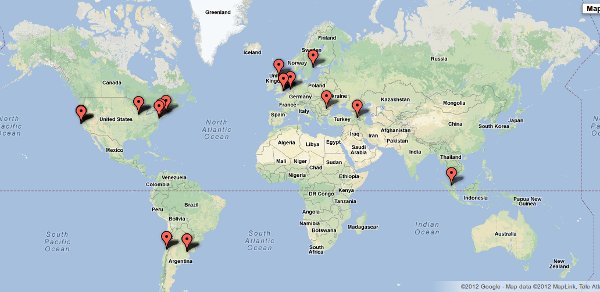I marvel at that map. OpenNews sponsored 21 hack days around the world during 2012. Mozilla, of course, is an international organization, and that map shows so clearly how international it and the journalism technology community are. And, 2013 is already on track to include events in Africa and in areas of Europe and Asia where OpenNews has not been before.* So, what all do those pins on the map represent?
Looking back - Hacking 2012 by the numbers
- 21 events
- 4 continents
- 2,100 participants
- 100+ projects created
In 2011, finalists for the Knight-Mozilla Fellowship came together at a single "hacktoberfest" event in Berlin. But this year, people around the world participated in events on open government data, elections, physical computing, and more. These events have been an incredible chance to support a growing community for journalism and technology and the local organizers who are building that community.
I saw myself in Philadelphia and London how some folks participated in one hackathon and then another and then joined the local developer community and began to see journalism technology as an exciting area of possibility when before the person wasn't aware it existed. It's really gratifying to see how these events help individuals become community leaders, teams build camaraderie, and existing organizations see the possibilities for collaboration and development.
Some takeaways
- Time and place - It really helped focus the development of projects when hackathons had specific themes that were timely and directly related to an anchor institution or topic. Given that it was an election year in the States, several events related to elections or campaigns. When organizers also had connections to institutions with particular data sets or tools like Cicero, it made project development happen much more smoothly.
- Language - For the Open Media Challenge, having English as a common language actually helped teams from several countries communicate. But we heard from other organizers that communications and documentation being English-only was limiting for some participants. Mozilla overall is working on localization efforts, and the 2013 cohort of Knight-Mozilla Fellows has helped expand the language skills of the OpenNews family. We're making some progress, and it's a good reminder to be thoughtful about language access when planning, promoting, and reporting back on events.
- Facilitation - Solid organization and facilitation during a hack day is absolutely critical to the success of the event. Gunner of Aspiration Tech is a flat-out amazing facilitator and we've been lucky enough to have his help running several events. In the coming year, we'll also be working on documenting some key tips for facilitators to help folks who run events on their own.
- Documentation - Ok, documentation is tough. It is. But it's way easier to document an event when doing so is baked into the event facilitation and done during the event itself. Having a single, editable doc to gather notes (wiki, etherpad, Google doc, what have you) helps a lot. It also helps to have a point person who takes notes and follows up with teams for additional details. Post-event write-ups are also often overlooked, but extraordinarily valuable both as a reference point and as a resource for other event organizers. I'm still thinking about ways to help documentation feel less like a chore, so suggestions are quite welcome.
- Connections and follow through - Hackathons are great community events. They're great for connecting within a local community, but events like the Hacks/Hackers Buenos Aires Media Party also create the kind of energy and leaders that beg to be shared with organizers in other cities. The Hacks/Hackers session at the Mozilla Festival showed how much interest there is in organizers in different cities learning from and collaborating with one another. In 2013, I'm hoping to be able do more to connect folks in different cities. Beyond person to person connections, OpenNews has a whole ecosystem to support follow through. Plus, great ideas that continue being worked on after an event can also draw notice, such as the Political Colours of Romania map from the Open Media Challenge, which got picked up by mainstream news outlets in Romania.
Looking ahead
So, what's next in 2013? More. More locations. More new faces. More connective tissue. Please reach out if you have an event you're working on or just want to chat a little bit about how to support the community in your area.
I'm really excited about experimenting on the "connective tissue" piece. Code Sprint grants are an awesome step in connecting the creativity and passion hackathons are good at fostering to creating tools that actually make it to reporters' tool kits. The Fellowship program is an exceptional experience for a lucky few. Source is creating a space online for the journalism code community to connect and share their brilliance. But, with hack days, it's exhausting spending every weekend (or even a weekend a month) at a hackathon. And you look around, and lots of people are fighting through that exhaustion and participating anyway. The interest is there in building amazing code, connecting with peers, and supporting this growing community. So, I'm eager to figure out what we can do to support one another in between events. Is it having follow up project nights like Azavea held after its Hacks for Democracy hackathon? Is it supporting one another in informal teaching to help folks gain confidence in public speaking and teaching? Is it building on existing events in new ways? I'm not sure. But I'm eager to experiment and iterate, just like software development has taught me to do.
Keep an eye out for events in 2013 (the fun starts in January!) and for updates on the projects and collaborations that began at events in 2012. Thanks to everyone who participated, organized, or helped spread the word about events in 2012. Look forward to more hacking next year.
* Australians: contact us, please! Help us have a presence on every human-habitable continent.)
